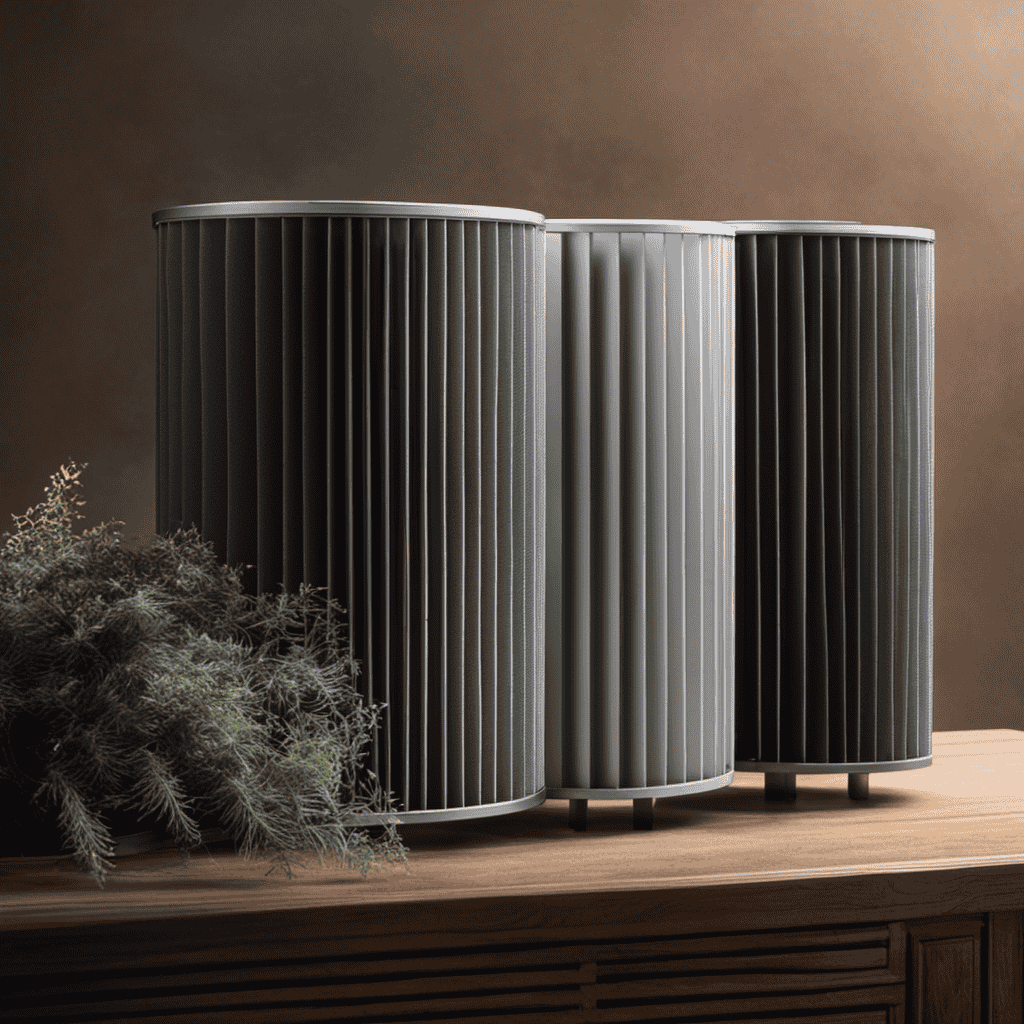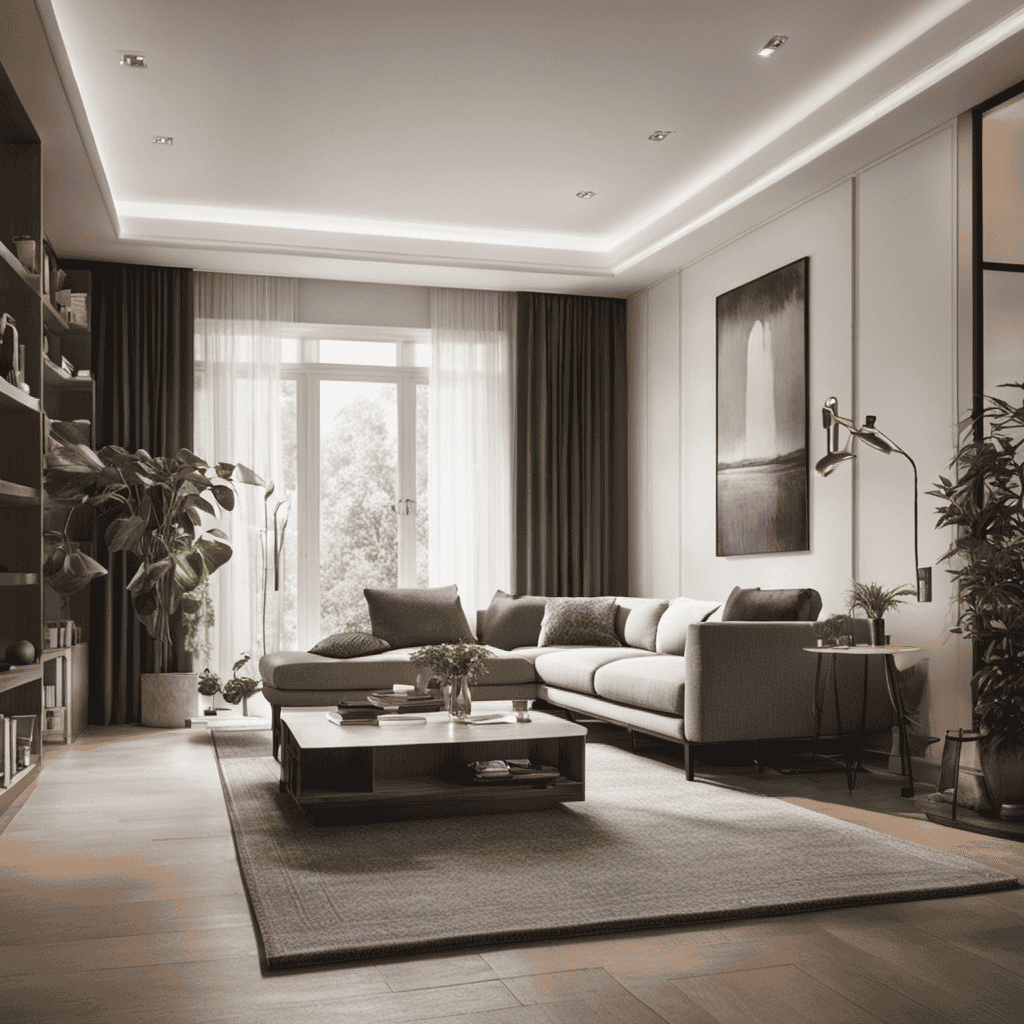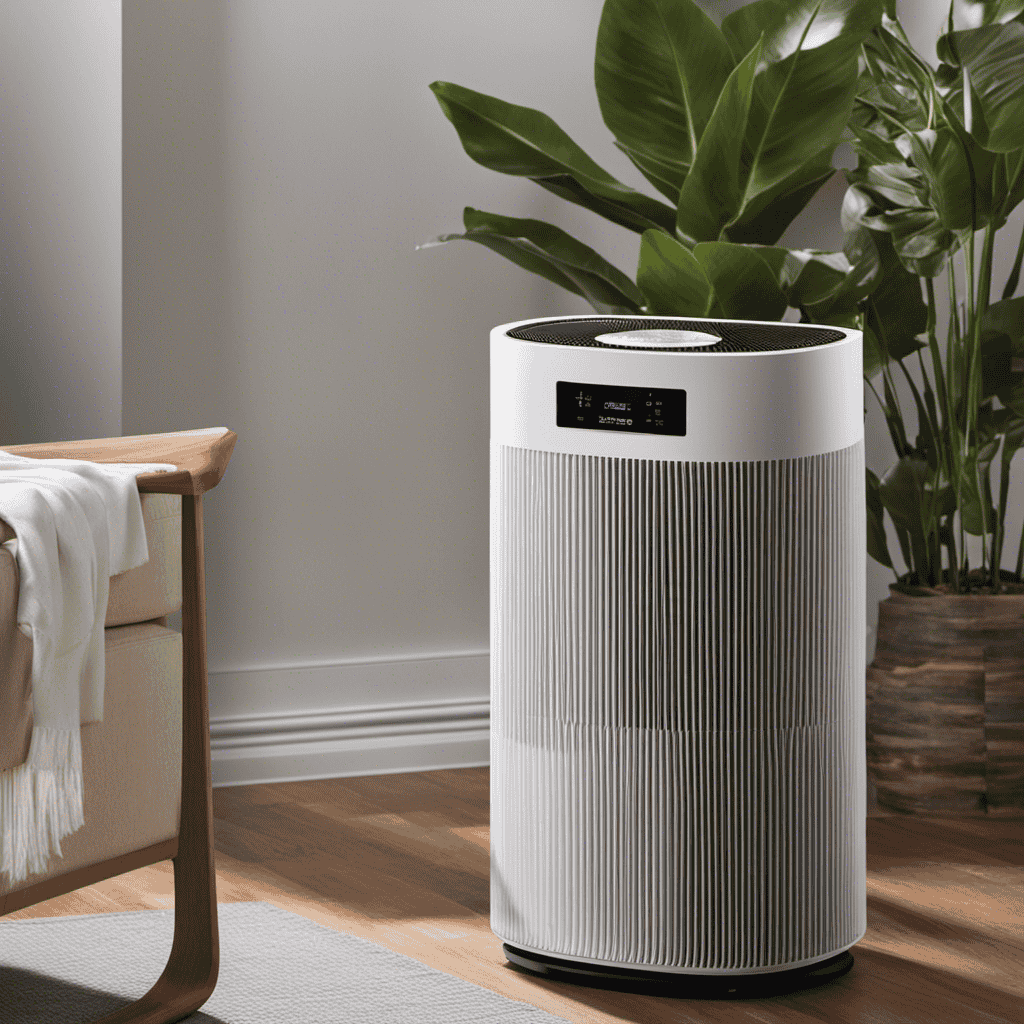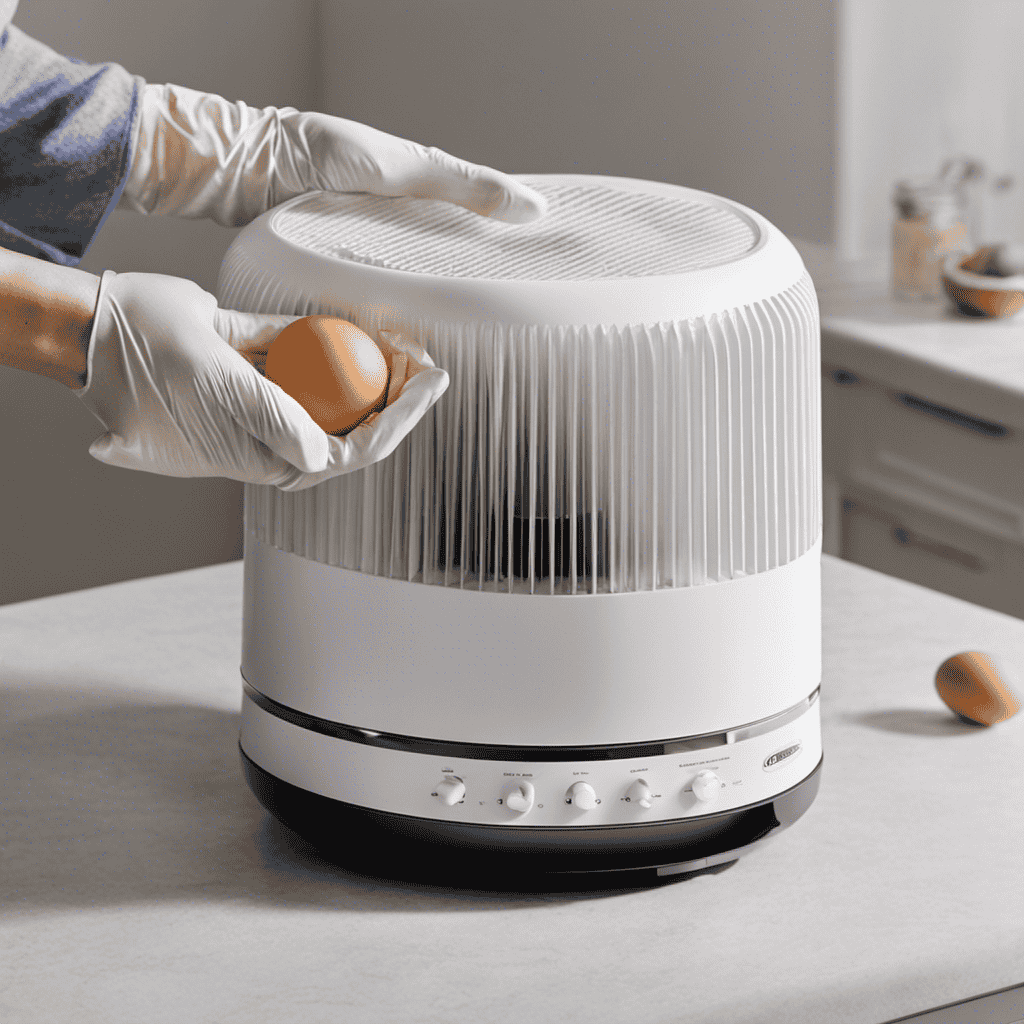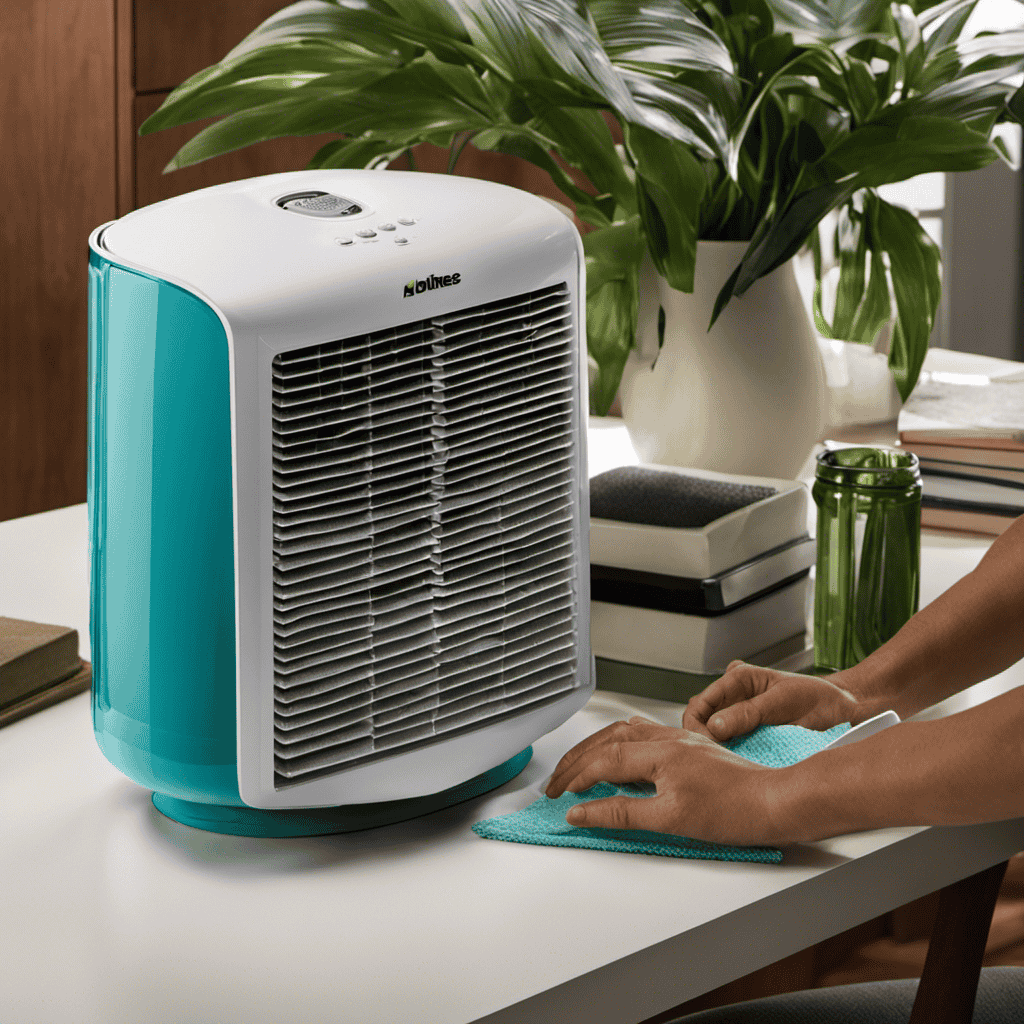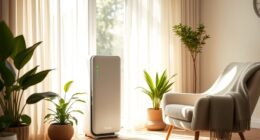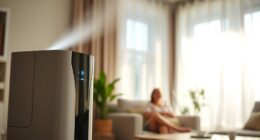Is the air you’re breathing clean or is your air purifier filter worn out? Don’t risk your health due to an old filter.
In this article, I’ll guide you through the signs that indicate it’s time to replace your air purifier filter. We’ll discuss the lifespan of these filters, how often they should be replaced, and factors that can affect their longevity.
Plus, I’ll share the importance of regular maintenance and how to properly install a new filter. Breathe easy as we delve into the world of air purifier filter replacement.
Key Takeaways
- Signs of decreased air quality and increased allergy symptoms indicate that it’s time to replace your air purifier filter.
- Regular maintenance, including cleaning and keeping the filter in a clean environment, can help extend the lifespan of your air purifier filter.
- It is recommended to replace the filter every six to twelve months to maintain optimal air quality and prevent reduced performance.
- Environmental factors such as air pollution and allergens can impact the performance of your air purifier filter, so regular maintenance is crucial for efficient filtration.
Signs It’s Time to Replace Your Air Purifier Filter
If you notice a decrease in air quality or an increase in allergy symptoms, it’s probably time to replace your air purifier filter. Filter maintenance is crucial for ensuring the effectiveness of your air purifier and the importance of clean air cannot be overstated.
Over time, air purifier filters become clogged with dust, pollen, pet dander, and other airborne particles. As a result, the filter’s ability to capture and remove these contaminants diminishes. This can lead to decreased air quality in your home and an increase in allergy symptoms.
Regularly replacing your air purifier filter is essential to maintain optimal air quality and protect your health. By keeping your filter clean, you can ensure that your air purifier continues to efficiently remove pollutants and provide you with clean, fresh air.
Understanding the Lifespan of Air Purifier Filters
As an expert on air purifier filters, I can provide valuable insights into the lifespan of these essential components.
In this discussion, we will delve into three key points: filter replacement frequency, signs of filter deterioration, and methods to extend the filter lifespan.
Understanding these factors will help you optimize the performance and efficiency of your air purifier while maintaining a clean and healthy indoor environment.
Filter Replacement Frequency
The filter in an air purifier should be replaced regularly to maintain its effectiveness. The frequency of filter replacement depends on various factors, including the quality of the air purifier filter and the environment in which it is used.
Higher quality filters are generally more durable and can last longer before needing replacement. However, if the air in your surroundings is heavily polluted or if you have pets, the filter may need to be replaced more frequently.
Additionally, the cost of filter replacement should also be considered. Some filters may be more expensive to replace than others, so it is important to factor in the ongoing filter replacement cost when purchasing an air purifier.
Signs of Filter Deterioration
Regularly replacing the filter in an air purifier is crucial to ensure clean and healthy air in your living space. Filter maintenance is an essential part of owning an air purifier, as a dirty or clogged filter can reduce its effectiveness in removing pollutants from the air. To help you determine when it’s time to replace the filter, many air purifiers come equipped with filter replacement indicators. These indicators monitor the airflow and particle levels in the air purifier and notify you when the filter needs to be changed. By paying attention to these indicators and following the manufacturer’s guidelines, you can ensure that your air purifier is always operating at its best and providing you with the cleanest air possible.
| Column 1 | Column 2 | Column 3 |
|---|---|---|
| Filter Replacement Indicators | Purpose | Notify when filter needs to be changed |
| Clean Air | Importance | Ensures healthy air in living space |
| Manufacturer’s Guidelines | Follow | Maximize air purifier’s effectiveness |
Extending Filter Lifespan
To extend your filter’s lifespan, you can follow these simple tips.
Regular maintenance is crucial for optimal performance and longevity. Firstly, make sure to clean your filter regularly. Depending on the type of filter, this may involve vacuuming or rinsing it with water. Be sure to consult the manufacturer’s instructions for guidance.
Additionally, keep your filter in a clean environment, away from dust and debris. This will prevent clogging and ensure proper airflow.
It’s also important to replace your filter when necessary. Pay attention to any signs of deterioration, such as reduced air quality or a decrease in filter effectiveness.
How Often Should You Replace Your Air Purifier Filter
You should replace your air purifier filter every six to twelve months. Regularly replacing your air purifier filter is crucial for maintaining clean and healthy indoor air quality. Over time, air filters become clogged with dust, allergens, and other pollutants, reducing their effectiveness in capturing harmful particles. Ignoring filter replacement can lead to decreased air purifier performance and potential health risks. To help you understand the importance of filter replacement frequency and recognize signs of filter deterioration, I’ve created a table below:
| Filter Replacement Frequency | Signs of Filter Deterioration |
|---|---|
| Every 6-12 months | Reduced airflow |
| Visible dirt or dust buildup | |
| Increased allergy symptoms |
Factors That Can Affect the Lifespan of Your Air Purifier Filter
As an expert in air purifier filters, I’d like to discuss two important topics: filter maintenance tips and the environmental impact on filters.
Proper filter maintenance is crucial for ensuring the efficiency and longevity of your air purifier. I’ll provide valuable insights on how to clean and maintain your filters. This will help you keep your air purifier running effectively and ensure that it continues to remove pollutants from your indoor air.
Additionally, I’ll discuss the potential effects of factors such as air pollution and allergens on the performance of your filters. Understanding how these environmental factors can impact your filters will help you make informed decisions about when to replace them and how often to clean them.
Filter Maintenance Tips
Proper filter maintenance is essential for optimal air purifier performance. Regularly cleaning and maintaining your air purifier filter is crucial to ensure that it continues to function effectively.
There are various filter cleaning techniques that can be employed, depending on the type of filter you have. For example, if you have a washable filter, you can simply rinse it under running water and let it air dry before reinserting it into the purifier. On the other hand, if you have a disposable filter, it is important to replace it according to the manufacturer’s recommendations.
Regular filter maintenance not only prolongs the lifespan of the filter but also ensures that it continues to trap airborne particles efficiently. This is especially important for individuals with allergies or respiratory conditions.
Moving on to the next section, let’s explore the environmental impact on filters.
Environmental Impact on Filters
The environmental impact on filters can vary depending on the type of filter used and the disposal methods employed.
When it comes to filter disposal, it is crucial to consider the impact on indoor air quality. Improper disposal of filters can lead to the release of harmful pollutants into the environment, which can have detrimental effects on our health.
It is important to follow proper disposal methods, such as recycling or disposing of filters in designated hazardous waste facilities. This ensures that any contaminants trapped in the filters are disposed of safely and do not contribute to the degradation of air quality.
The Importance of Regular Maintenance for Your Air Purifier Filter
You should make sure to regularly maintain your air purifier filter to ensure its effectiveness. Filter maintenance is crucial for the proper functioning and longevity of your air purifier. Neglecting to clean or replace the filter can lead to a decrease in air quality and the efficiency of the unit. By following the manufacturer’s guidelines and performing routine maintenance, you can prolong the lifespan of your filter and maintain optimal performance. Here is a table outlining the recommended maintenance schedule for different types of air purifier filters:
| Filter Type | Maintenance Frequency |
|---|---|
| HEPA | Every 6-12 months |
| Carbon | Every 3-6 months |
| Pre-filter | Every 1-3 months |
Regularly inspecting and cleaning your filters will ensure that your air purifier continues to remove pollutants effectively and provide you with cleaner, healthier air. Remember, proper filter maintenance is key to maximizing the lifespan and efficiency of your air purifier.
What Happens if You Don’t Replace Your Air Purifier Filter on Time
When you neglect to replace your air purifier filter on time, several negative consequences can occur.
First, the air quality in your home will begin to deteriorate as the filter becomes clogged with dirt, dust, and other pollutants.
This can lead to an increase in allergens and irritants circulating in the air, potentially causing respiratory issues and other health risks.
Additionally, the reduced effectiveness of the filter means it won’t be able to efficiently capture and remove harmful particles, further compromising the overall air quality in your living space.
Air Quality Deterioration
If air quality is deteriorating, it’s time to replace your air purifier filter. Indoor air contaminants, such as dust, pet dander, pollen, and mold spores, can accumulate over time and reduce the effectiveness of your air purifier. Regularly replacing your air purifier filter is essential to maintain clean indoor air and prevent these harmful effects. A clogged or dirty filter cannot effectively capture and remove these contaminants, leading to a decline in air quality. By replacing your air purifier filter when air quality is deteriorating, you can ensure that your purifier continues to provide you with clean and healthy air.
Air pollution effects can have a significant impact on our health, both indoors and outdoors. As these pollutants accumulate in the air, they can trigger allergies, asthma attacks, and other respiratory issues.
Reduced Filter Effectiveness
A clogged or dirty filter won’t effectively remove contaminants, leading to a decline in indoor air quality. It is crucial to be aware of signs indicating filter clogging, especially when the filter has been in use for an extended period.
One sign to look out for is reduced airflow from the air purifier. If you notice that the air coming out of the device is weaker than before, it could be due to a clogged filter.
Another indication is an increase in dust and debris in the room, even with the air purifier running. This suggests that the filter is no longer trapping particles effectively.
Prolonged filter usage can lead to a buildup of pollutants, reducing the filter’s effectiveness and compromising the air quality in your space. Therefore, it is essential to regularly monitor and replace your air purifier filter to maintain optimal performance and ensure clean indoor air.
Potential Health Risks
In addition to reduced filter effectiveness, not replacing your air purifier filter regularly can also pose potential health risks.
Over time, filters become clogged with dust, allergens, and other pollutants, which can lead to a decrease in their ability to capture and remove these harmful particles from the air. As a result, the air purifier may not be able to effectively clean the air, allowing these pollutants to circulate back into your living space. This can trigger allergies, asthma symptoms, and other respiratory issues, especially for those with pre-existing conditions.
To minimize these potential risks, it is crucial to stay on top of filter maintenance and replace the filter as recommended by the manufacturer. Neglecting this task can compromise the air quality in your home and your overall well-being.
Now, let’s delve into how to check if your air purifier filter needs replacing.
How to Check if Your Air Purifier Filter Needs Replacing
You can easily check if your air purifier filter needs replacing by observing the color and condition of the filter. Here are some key points to consider when checking the effectiveness of your air purifier and troubleshooting any potential problems:
-
Visual inspection: Look at the color of the filter. A dirty or dark-colored filter indicates that it is time for a replacement.
-
Airflow reduction: If you notice a decrease in the airflow from your air purifier, it could be a sign that the filter is clogged and needs to be replaced.
-
Odor elimination: If your air purifier is no longer effectively removing odors from your space, it may be due to a saturated filter.
-
Allergy symptoms: If you or your family members start experiencing allergy symptoms, such as sneezing or coughing, it could be a sign that the filter is no longer capturing allergens effectively.
-
Manufacturer’s recommendations: Always refer to the manufacturer’s guidelines for the recommended lifespan of your air purifier filter. Replacing the filter within the specified timeframe ensures optimal performance.
Common Problems That Indicate a Worn-Out Air Purifier Filter
As an expert in air purification systems, I can confidently discuss the common problems that indicate a worn-out air purifier filter.
One key indicator is the presence of strange odors in the air, which often indicates that the filter is no longer effectively removing contaminants.
Additionally, a decrease in the air purification effectiveness can also be a sign that the filter needs to be replaced, as it may no longer be able to efficiently trap and remove harmful particles from the air.
Strange Odors Indicate Replacement
If your air purifier starts emitting strange odors, it’s time to replace the filter. Checking indicators and being aware of any unusual smells is crucial in maintaining the effectiveness of your air purifier. Here are five reasons why strange odors indicate the need for a filter replacement:
-
Accumulation of dirt and pollutants: Over time, the filter can become clogged with dirt and pollutants, leading to unpleasant odors.
-
Mold and mildew growth: Moisture can accumulate in the filter, creating a breeding ground for mold and mildew, which emit distinctive smells.
-
Bacterial buildup: Bacteria can thrive in a dirty filter, causing foul odors to circulate throughout your home.
-
Pet dander and odors: If you have pets, their dander and odors can get trapped in the filter, resulting in unpleasant smells.
-
Chemical odors: If your filter is unable to effectively remove chemicals from the air, you may notice strong odors lingering in your space.
Replacing the filter will not only eliminate strange odors but also restore the air purifier’s ability to effectively purify the air.
Decreased Air Purification Effectiveness
The effectiveness of your air purifier may decrease over time if the filter is not regularly replaced. Proper air purifier maintenance is essential to ensure optimal performance and clean air quality in your home.
Over time, the filter efficiency can degrade due to accumulated dust, pet dander, pollen, and other airborne particles. As these contaminants build up, they can clog the filter, restricting airflow and reducing its ability to effectively capture and remove pollutants from the air.
Regularly replacing the filter is crucial to maintain the air purifier’s efficiency and ensure that it continues to provide clean and healthy air. It is recommended to follow the manufacturer’s guidelines for filter replacement intervals to ensure maximum air purification efficiency and prolong the lifespan of your air purifier.
Tips for Extending the Life of Your Air Purifier Filter
To extend the life of your air purifier filter, you should regularly clean it and avoid placing it in areas with high levels of dust and pollutants. Cleaning the filter helps remove accumulated dirt and debris, allowing it to function optimally. Additionally, keeping the air purifier in a clean environment helps prevent clogging and reduces the strain on the filter.
Here are some filter maintenance tips:
- Clean the filter every 2-3 months, or as recommended by the manufacturer.
- Use a soft brush or vacuum cleaner to remove surface dust.
- Rinse the filter with water to remove stubborn particles.
- Allow the filter to dry completely before reinserting it into the air purifier.
- Consider using a pre-filter to capture larger particles and extend the lifespan of the main filter.
Different Types of Air Purifier Filters and Their Replacement Schedules
Regularly cleaning and replacing your air purifier’s filter is essential for maintaining clean and fresh air in your home or office. Understanding the lifespan and maintenance requirements of different types of air purifier filters can help you determine the best time to replace them.
There are various types of filters available, such as HEPA filters, activated carbon filters, and pre-filters, each with its own replacement schedule.
HEPA filters, known for their high efficiency in capturing small particles, typically have a lifespan of about 6 to 12 months. Activated carbon filters, which are effective in removing odors and chemicals, usually need replacement every 3 to 6 months. Pre-filters, designed to capture larger particles and prolong the lifespan of the main filter, should be cleaned or replaced every 1 to 3 months.
The Role of Air Quality in Determining When to Replace Your Filter
When determining when to replace your filter, it’s important to consider the role of air quality in maintaining a clean and healthy indoor environment. The quality of the air we breathe has a direct impact on our respiratory health, and poor air quality can lead to increased allergies and respiratory issues. Here are a few key points to consider:
- Regularly monitor the air quality in your home using an air quality monitor.
- Pay attention to any changes in air quality, such as increased levels of pollutants or allergens.
- Follow the manufacturer’s guidelines for filter replacement, as they are designed to ensure optimal performance.
- Consider replacing your filter more frequently if you have pets or live in an area with high levels of pollution.
- Consult with a professional if you have specific concerns about your indoor air quality.
By understanding the role of air quality and its impact on respiratory health, you can make informed decisions about when to replace your air purifier filter.
Now, let’s move on to discussing how to properly install a new filter.
How to Properly Install a New Air Purifier Filter
Once you have purchased a new filter, it’s important to follow these steps to properly install it.
First, ensure that your air purifier is turned off and unplugged before beginning the installation process.
Next, carefully remove the old filter by following the manufacturer’s instructions. Be cautious not to damage any components during this step.
Then, take your new filter and align it correctly with the designated slot in your air purifier. Make sure it fits snugly and securely.
Once it is in place, close the cover or panel firmly.
Finally, plug in your air purifier and turn it on.
It’s important to note that common mistakes during installation include forcing the filter into the slot, not aligning it properly, or forgetting to turn off the device before starting.
Benefits of Replacing Your Air Purifier Filter on Time
One major advantage of timely filter replacement is that it helps maintain clean and fresh indoor air quality. When you replace your air purifier filter on time, you can experience several benefits:
-
Improved air circulation: A clean filter allows for better airflow, ensuring that your indoor space is properly ventilated.
-
Reduced energy consumption: A clogged filter can cause your air purifier to work harder, leading to increased energy usage and higher utility bills.
-
Allergy relief: Replacing your filter regularly helps remove allergens such as pollen, dust, and pet dander from the air, reducing the impact on allergies.
-
Prolonged lifespan of your air purifier: A clean filter prevents dust and debris from accumulating on the internal components, helping to extend the life of your air purifier.
-
Enhanced overall performance: By maintaining a clean filter, your air purifier can effectively remove pollutants, odors, and harmful particles from the air, ensuring a healthier environment.
Where to Buy Replacement Filters for Your Air Purifier
You can easily find replacement filters for your air purifier at various online retailers. When it comes to where to find affordable replacement filters, there are several options available.
Websites such as Amazon, Walmart, and Home Depot offer a wide range of air purifier filters at competitive prices. It is important to choose a filter that is compatible with your specific air purifier model to ensure optimal performance.
When it comes to cleaning and maintaining your air purifier filter, it is recommended to follow the manufacturer’s instructions. Some filters can be cleaned and reused, while others need to be replaced entirely.
Regular cleaning and maintenance will help prolong the lifespan of your filter and ensure that your air purifier continues to function effectively in removing airborne pollutants from your indoor environment.
FAQ: Answers to Common Questions About Air Purifier Filter Replacement
If you’re wondering how often to clean your air purifier’s filter, it’s recommended to follow the manufacturer’s instructions. The filter replacement frequency varies depending on the type of air purifier and the level of pollutants in your environment.
However, regular maintenance is crucial to ensure the effectiveness of your air purifier. Here are five important points to consider:
-
Check the manufacturer’s guidelines: Different air purifier models have different recommendations for filter replacement frequency.
-
Monitor air quality: If you notice a decrease in air quality or an increase in allergy symptoms, it may be time to replace the filter.
-
Clean the pre-filter regularly: The pre-filter captures larger particles and can become clogged over time, reducing the efficiency of the main filter.
-
Consider the type of filter: HEPA filters typically require replacement every 6 to 12 months, while carbon filters may last longer.
-
Keep track of usage: If you use your air purifier more frequently or in a highly polluted area, you may need to replace the filter more often.
Regular maintenance and timely filter replacement are essential to ensure that your air purifier continues to provide clean and fresh air.
How Often Should I Change My Air Purifier Filter?
It is recommended to do a levoit air purifier filter change every 6 to 12 months, depending on usage and air quality. Regular replacement ensures optimal performance and cleaner air in your home. Be sure to follow the manufacturer’s guidelines for your specific model to maintain efficiency.
Frequently Asked Questions
Can I Clean My Air Purifier Filter Instead of Replacing It?
Yes, you can clean your air purifier filter instead of replacing it. However, there are pros and cons to consider. Cleaning can extend the filter’s lifespan, but it may not completely remove all pollutants.
Is It Necessary to Replace the Air Purifier Filter if I Use My Purifier Infrequently?
It’s important to replace the air purifier filter regularly, even if you use it infrequently. Cleaning air purifier filters may not be enough to capture all the pollutants, and replacing them ensures optimal performance and benefits for your health.
How Do I Know if My Air Purifier Filter Is Compatible With My Air Purifier Model?
To ensure optimal air quality and proper filter maintenance, it is crucial to determine if your air purifier filter is compatible with your specific model. This information can be found in the user manual or on the manufacturer’s website.
Are There Any Health Risks Associated With Using an Old or Worn-Out Air Purifier Filter?
Using a dirty air purifier filter poses health risks. Regularly replacing the filter is crucial to maintain optimal air quality. It ensures the filter’s effectiveness in removing pollutants, allergens, and improving overall indoor air quality.
Can I Use a Generic or Third-Party Replacement Filter for My Air Purifier?
I can use generic replacement filters for my air purifier, but there are benefits to using branded filters. Branded filters are specifically designed for my purifier model and offer better filtration performance and longevity.
Conclusion
In conclusion, replacing your air purifier filter is crucial for maintaining clean and healthy indoor air. By understanding the signs of a worn-out filter and the factors that affect its lifespan, you can ensure optimal performance of your air purifier.
Regular maintenance and proper installation are key to prolonging the filter’s effectiveness. Don’t wait until it’s too late, as replacing your filter on time can provide numerous benefits for your respiratory health.
Remember, clean air is just a filter replacement away. Stay tuned for more expert tips on air purification.
